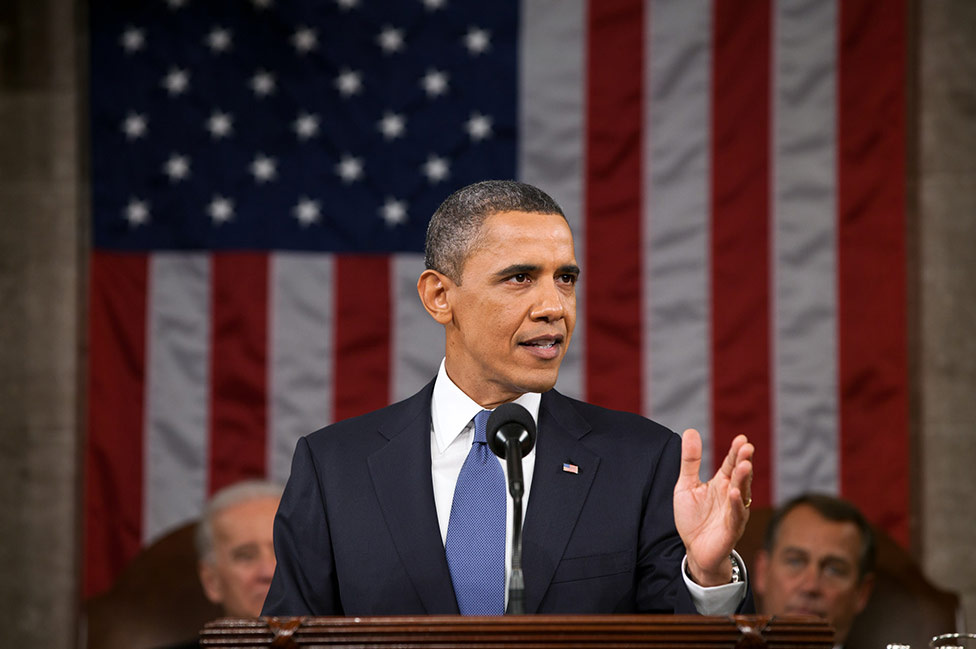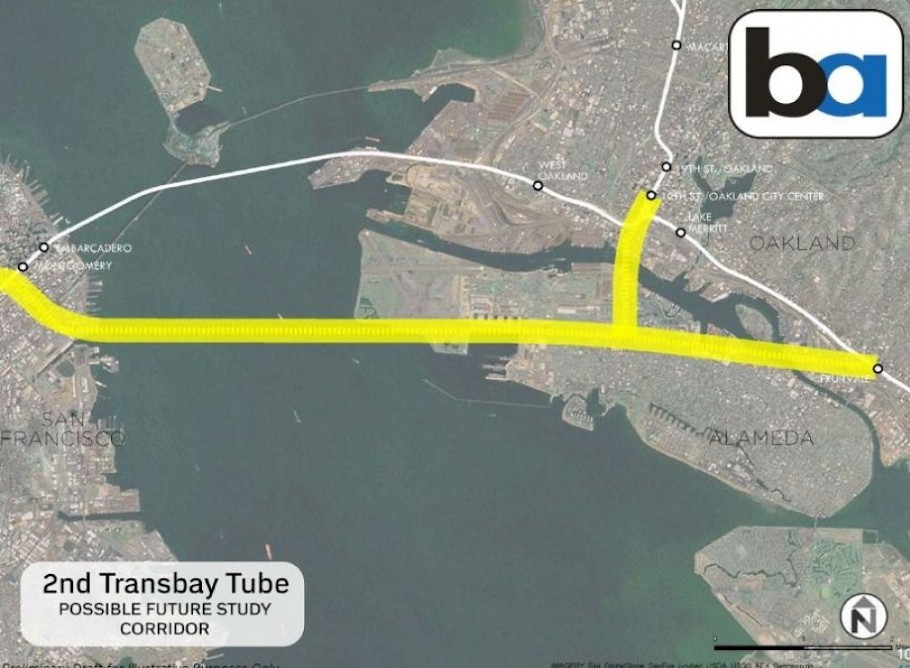Happening Now
Hotline #895
January 23, 2015
President Barack Obama made a strong economic case for more investment in U.S. transportation in his January 20 State of the Union, saying "21st century businesses need 21st century infrastructure — modern ports, stronger bridges, [and the] faster trains"
The call proved to be one of the few areas of bipartisan accord, with Representative Bill Shuster (R-PA) responding that there is broad, bipartisan agreement on the need to modernize America’s infrastructure.
"I believe that it is imperative that we repair our crumbling infrastructure through fiscally responsible legislation," said Rep. Shuster in a statement responding to the President’s address. "As chairman of the Transportation and Infrastructure Committee, I am working to pass a surface transportation bill that makes investments in our nation’s roads and bridges to keep America competitive in a global economy."
Shuster Chairs the House Committee on Transportation & Infrastructure, and while he didn’t include a specific proposal for funding the bill, he said that the political will to raise the gas tax isn’t there during a January 22 speech to the U.S. Conference of Mayors. This may be surprising to some readers, given the fact that gas prices have plunged to nearly $2 per gallon, down 40% since last June. However, Shuster believes a comprehensive overhaul of the tax system is the most likely way forward in securing additional revenue for a multi-year transportation bill. That sentiment was echoed by the Administration.
“We think the business tax reform approach is practical and it's something that this Congress can do without falling off of principle,” Transportation Secretary Anthony Foxx told Bloomberg News at the same conference of mayors. “You can do it without raising deficits, without increasing tax rates, and inject a substantial amount more into the infrastructure that we have and that we need.”
The current surface transportation bill expires in March of this year. It will be an uphill battle to ensure that funding for passenger trains is included in a surface transportation bill, but NARP and its leaders are working hard to make the case for investing in a modern, passenger-focused transportation network.
Indiana Department of Transportation Commissioner Karl Browning told the Indiana House Ways and Means Committee this week that INDOT and Amtrak are close to finalizing a 60-day extension of their current agreement, currently scheduled to end on January 31st.
Browning also said that INDOT is close to finalizing an agreement with Iowa Pacific as the new private entity involved with the Hoosier State.
Browning's comments came in response to questions from State Rep. Dan Truitt, who has proved to be a determined and effective advocate for the Hoosier State over the past year.
Governor Andrew Cuomo called for the construction of an elevated AirTrain to connect New York City to LaGuardia Airport, providing a long-desired rail link to one of the busiest airports in the U.S.
The Governor’s plan calls for the construction of a 1.5 mile link between the existing Willets Point station, which serves LIRR and the No. 7 subway line, and the LaGuardia Airport in Queens.
"You can't get to LaGuardia by train,” said Governor Cuomo. “That really is inexcusable, and that is going to change.”
Cuomo projects the cost of the project will be roughly $450 million, and argued that the link will be an important part in ensuring that New York City remains a globally competitive city in which to do business.
"We must rebuild over the next few years," Cuomo added. "We have not kept pace with the rest of the world and our competitors."
However, while the need for a better way to get to LaGuardia is near-universally acknowledged, some critics of the plan say the Governor’s proposal isn’t the right way to go about it because it won’t cut trip time by a sufficient factor.
The Minnesota Department of Transportation released the final scoping document for a proposed modern rail corridor that would run 100 miles between Rochester and the Twin Cities.
The document outlines the transportation needs that the project will fulfill, along with an evaluation of alternatives. It also models the potential social, economic, and environmental benefits and impacts the project would bring to the state.
“The study area includes Dakota, Dodge, Goodhue, Hennepin, Olmsted, Ramsey and Rice counties and various termini, or end points, in the Twin Cities and Rochester area,” reports MinnDOT on the ZipRail website. “There is no continuous existing railroad connection between the Twin Cities and Rochester. The project will evaluate the use of existing transportation corridors, however, some of the corridors to be evaluated have the potential to create new or "greenfield" transportation routes.”
San Francisco’s Mayor Ed Lee has endorsed a second Bay Area Transportation Authority (BART) rail tunnel under the San Francisco Bay to meet exploding demand for greater mobility and housing access in the region.
There is currently a single transbay tube serving BART commuter trains, carrying workers from East Bay into San Francisco’s rapidly developing city center. As the tech sector explodes, regional leaders are looking to eliminate this chokepoint, which would allow for 24-hour service.
The Mayor’s office also looks at expansion of the transit system—coupled with Transit Oriented Development—as a solution to soaring housing prices, a factor which is constricting the labor pool.
“The housing crisis is a regional one,” Christine Falvey, spokesman for Mayor Lee, told the San Francisco Chronicle. “As the mayor looks at where housing is going to be built not only in San Francisco but around the Bay Area, it’s clear the capacity will have to be increased on BART.”
U.S. Representative Mike Quigley (D-IL) took a public tour of Chicago’s rail facilities with Amtrak officials to highlight the need for increased public investment in passenger trains.
“Chicago is the nation’s rail hub, serving as the backbone of our city and region’s economic success. But, crumbling infrastructure is slowing our economic growth. Passenger and freight trains share railroads in a heavily trafficked area, slowing commerce and passengers from getting where they need to be,” said Rep Quigley. “Investing in infrastructure isn’t just an investment in our economy, but our environment. Mass transit provides an environmentally friendly, affordable alternative to driving. But, the mass transit option has to be reasonable. On the trip, I experienced the same frustrating issues that face commuters and would-be commuters. We’ve identified a problem. Now, we must work on a solution. I will continue working with stakeholders on the 75th Street Corridor Improvement Project to address the congestion that hurts our region’s flow of commerce and commuters.”
Rep. Quigley traveled from Chicago Union Station to New Buffalo, Michigan to get a fist-hand look at the congestion and delays that are hurting passengers of Amtrak and Metra, as well as inhibiting the movement of important goods across freight lines. They looked at one project in particular that would ease train movements through the city: the 75th Street Corridor Improvement Project (CIP), part of the larger Chicago Region Environmental and Transportation Efficiency (CREATE) program.
“The next big steps to improve the reliability of passenger and freight trains service are the on 75th Street corridor in Chicago and in the tangle of tracks over the border near Hammond, Ind.,” said Ray Lang, Amtrak Senior Director. “We appreciate Rep. Quigley’s direct interest and the chance to show him first-hand the problems and the potential solutions that could be realized across entire the rail network.”
As a member of the House Appropriations committee, Rep. Quigley has said he will dedicate himself to securing funding for additional infrastructure investments.
The Boston Globe is reporting that the MBTA will be forced to take 40 new locomotives out of service on its commuter rail system to allow for the replacement of faulty ball bearings.
Eight locomotives have already been repaired, but the work on the remaining equipment will delay the start date for the remainder of the order. Manufactured by Motive Power Inc. of Boise, Idaho, the locomotives cost the transportation authority roughly $220 million. The precision ball bearings are being replaced at no cost to the MBTA.
News in Brief
—The Lone Star Rail District is hosting a series of outreach sessions to gather public input on the development of train service between San Antonio and Austin. LSRD has announced the following events:
- Jan. 26, San Marcos Activity Center, 501 E. Hopkins Street, San Marcos, 5:00 - 8:00 p.m.
- Jan. 27, Elgin High School, 14000 County Line Road, Elgin, 5:30 - 8:30 p.m.
- Jan. 28, Georgetown Chamber Events Center, 1 Chamber Way, Georgetown, 5:00 - 8:00 p.m.
- Jan. 29, Seguin Coliseum, 950 S. Austin Street, Seguin, 5:00 - 8:00 p.m.
—All Aboard Florida announced that it has selected a general contractor to oversee construction of three new stations that will serve the Miami – Orlando train service. Construction is slated to begin in March.
“This announcement is another step forward as All Aboard Florida moves int o the construction and implementation phase,” said All Aboard Florida President Michael Reininger. “Moss & Associates has a world-class reputation and is the right firm to help us deliver our Fort Lauderdale and West Palm Beach stations.”
—The city of Raleigh issued an updated cost estimate for the city’s Union Station project, with the most ambitious version of the new downtown intermodal train station costing $16 million more than anticipated. The increase comes primarily from rising property values and unanticipated utility costs, and the city will now have to decide whether to find additional funding or roll back plans for the station’s scope. The city council was adamant, however, that the station must progress in some form.
“We need to move forward,” Council member John Odom. “The city of Raleigh’s moving fast, and we need great opportunities.”
—A group of state legislators from Western Massachusetts have announced they will push for a feasibility study to increase service between Springfield and Boston.
State Senator Eric Lesser (D-Longmeadow) believes that more frequent and reliable service will act as an economic catalyst for the region, which has failed to match the growth experienced by the greater Boston metropolitan area.
"If greater Springfield was better linked to those centers of economic opportunity, it will bring more benefits to us, allow us to bring and grow more jobs here and to raise property values," Senator Lesser told MassLive.
Travelers Advisory
--Beginning January 26, Sunset Limited Trains No. 2 and No. 422 (with Texas Eagle through cars) will depart Los Angeles two hours earlier than usual at 8:00 PM to accommodate Union Pacific Railroad track rehabilitation work. The trains will operate two hours earlier at all stops through El Paso, when a two hour layover will allow the train to return to its regular schedule. The temporary schedule will be in place through March 22.
"It is an honor to be recognized by the Rail Passengers Association for my efforts to strengthen and expand America’s passenger rail. Golden spikes were once used by railroads to mark the completion of important rail projects, so I am truly grateful to receive the Golden Spike Award as a way to mark the end of a career that I’ve spent fighting to invest in our country’s rail system. As Chair of the Transportation and Infrastructure Committee, it has been my priority to bolster funding for Amtrak, increase and expand routes, look to the future by supporting high-speed projects, and improve safety, culminating in $66 billion in new funding in the Bipartisan infrastructure Law."
Representative Peter DeFazio (OR-04)
March 30, 2022, on receiving the Association's Golden Spike Award for his years of dedication and commitment to passenger rail.


Comments